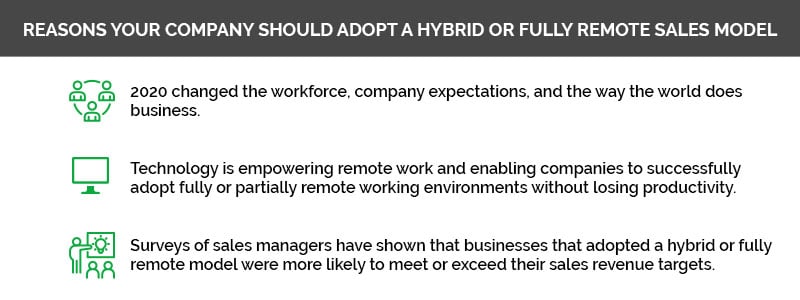3 Reasons Your Company Should Adopt a Hybrid or Fully Remote Sales Model

Some of the most successful companies in the world have adopted hybrid sales models, and they’re experiencing growth because of it. Here’s what you need to know about how to implement one and ensure your sales team remains productive in the process.

The year 2020 will likely live in infamy for many reasons, including its impacts on business, our ability to make human connections, and how we view the traditional workday. It changed our perception of daily life, and nobody knows this better than the companies that had to adjust their operations to stay afloat.
Businesses have been forced to take on a remote-first mindset across the board, whether for sales, customer service, production, or distribution. Those that made the shift have seen success – and even exceeded their goals – while those that did not have been left in the dust.
As cities open up and workers return to the office, it’s important to note that things will never be what they were. Companies have had to anticipate the need for permanently remote workers, with most choosing a hybrid model with a mix of on- and off-location personnel. Here’s what you need to know about permanently shifting to a remote or hybrid business model.
How remote work in 2020 changed business forever
By mid-March 2020, it was clear that simply having an email for occasionally sending documents between colleagues was no longer enough to ensure productivity. Daily in-person meetings to track projects, being able to quickly pop in someone’s office with a question, or having a centralized phone system through which a receptionist could transfer calls as needed were suddenly gone. That meant companies were forced to seek greater digitization so they could better handle their processes, as well as more security for their proprietary data.
This process involved significant changes and moments of differentiation, such as:
- Robust remote business tracking solutions – Companies with good remote solutions and documentation policies in place were able to hit the ground running, while others fished around for the necessary tools. The most sought-after tools eased and improved communication.
- Bandwidth woes – Increased bandwidth became a hot commodity as the use of digital file storage and transfers, instant messaging, and video calling and conferencing rose.
- Mindset shifts – Employees who had never worked outside an office before suddenly found they could be just as productive from home so long as they had necessary tools like reliable internet connection and apps to help them.
- Company buy-ins – Executives and business owners have recognized that furnishing their employees’ work-from-home setups with business-grade products, internet connectivity, and security are crucial to conducting business.
- Redesigning and accommodating with work in mind – Workers and employers had to rethink even their living spaces as they sought places to hunker down. Decisions about internet speed, cybersecurity, distractions, and noise levels have become increasingly important as businesses and employees face the prospect of working from home permanently or semi-permanently.
The things that have not changed are companies’ growth goals and need for their employees to deliver the same high-level efforts they always have – regardless of where they’re working from. Technology and the right company mindsets can help make that growth a reality.
3 reasons your company should consider a hybrid sales model
A hybrid workplace can be successful thanks to technological advances. This model offers options for some salespeople to work from home, others at the office, and a few shuttling back and forth. This is a radical change, but not more so than the complete shutdown the world went through before!
The technology is available to make sure your sales people are just as effective – if not more so – under a hybrid sales model than ever. Here are some of the reasons it’s worth considering:
Enhanced safety
Ever-evolving capabilities can do various things to ensure employees’ safety while at the office. IoT-enabled sensors can count the number of people in the building to limit numbers to safe levels, for example, plus indicate which desks need sanitization after use.
AI can compile all the data from such sensors to pinpoint areas of alarm and maximize employee safety. It can also analyze building plans to facilitate automatic social distancing and limit touchpoints.
Other tech-supported solutions for health safety management include contactless entry, the compilation and publishing of health policy declarations and mandates, and improving contact tracing should an infection occur.
Efficiency boosts
A distributed workforce means the question of how to optimize office space availability has become important. Some companies are now practicing hot-desking, which involves allocating desks and spaces based on need.
A hybrid sales model would see the salespersons or teams with the most need for, say, a conference room or particular office space getting priority to use it while others with less urgent need work remotely. AI-based solutions can automate this entire process, allowing personnel to book desks and meeting rooms when they need them for as long as necessary. These applications can also highlight spaces that are underutilized, enabling you to make decisions about offloading them to cut costs.
Productivity and collaboration
An added benefit of a hybrid sales model for your sales team is the transparency you can achieve. The last two years have seen increased reliance on productivity tracking software, and that’s something that many companies will (and should) continue to use in the future.
These solutions help keep notes on your team’s efforts in a centralized location so everyone has access to the work being done. Enterprise apps allow you to record information related to sales schedules and remote appointments in one place, for example. This helps with collaboration, enables sales staff to plan their schedules, and ensures they’re poised for the greatest impact on the days when they come to the office.
Hybrid sales models are the future: get help planning for yours
The world of business is always evolving, but it’s safe to assume we are in a new normal. The companies that evolve with emerging technological and operational advances – including changes to the traditional work model – will see more success than those that remain firmly lodged in their operations of the past. Companies today are choosing hybrid or remote models for their workforce and seeing great success with it – so long as they’ve got goals, structure, and routines in place to do so.
If you’re wondering how to make a hybrid sales model work to your benefit, contact MetaGrowth Ventures today. Our experts are here to help ensure you’ve got the strongest, best-trained, and most engaged sales team in place to achieve your business goals, regardless of where those personnel work from. Let us help you get the right sales force in place so your business can achieve all its goals.
Written by
Joe Arioto
